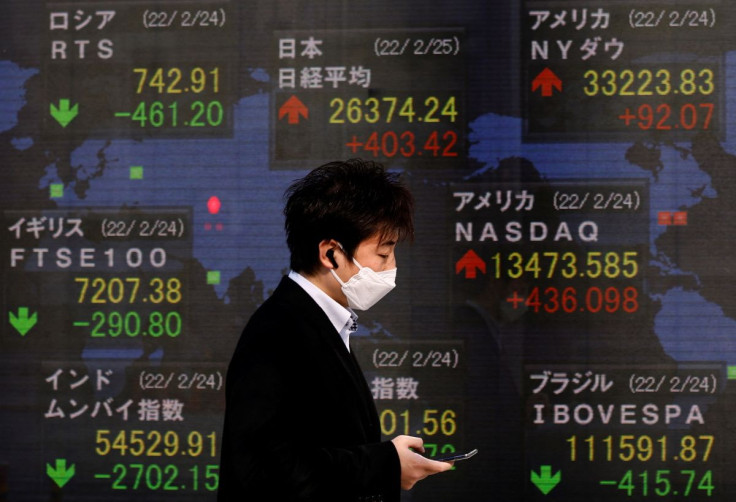Dollar, US Stocks Fall On Inflation Concerns

The U.S. dollar index fell from 20-year highs while Wall Street equities were lower on Friday with the latest economic data Amazon.com's disappointing quarterly report and outlook keeping the spotlight on surging inflation.
In U.S. treasuries the benchmark 10-year yields capped off their biggest monthly gain since December 2009 by rising near their highest levels of the year after economic data.
Equities were also under pressure after data showed that monthly inflation surged by the most since 2005 while U.S. consumer spending increased more than expected in March amid strong demand for services. Also, first quarter U.S. labor costs surged by the most in 21 years, pointing to rising wage inflation, supporting Federal Reserve's policy tightening.
"Core inflation was well contained, but that's little solace for those whose real disposable incomes are falling. The Employment Cost Index rose more than expected and when you combine that with the negative GDP print, unit labor costs for Q1 will pop higher as productivity fell," said Brian Jacobsen, senior investment strategist for multi-asset solutions at Allspring Global Investments.
The Dow Jones Industrial Average fell 389.58 points, or 1.15%, to 33,526.81, the S&P 500 lost 72.51 points, or 1.69%, to 4,214.99 and the Nasdaq Composite dropped 221.95 points, or 1.72%, to 12,649.58.
The pan-European STOXX 600 index rose 0.73% and MSCI's gauge of stocks across the globe shed 0.52%.
On the last trading day of April, the world stock index was on course for its biggest monthly decline since March 2020.
Amazon shares were down more than 12% after the e-commerce giant delivered a disappointing quarter and outlook late Thursday as was swamped by higher costs to run its warehouses and deliver packages to customers..
Emerging market stocks were rising 2.38% however as MSCI's broadest index of Asia-Pacific shares outside Japan closed 2.35% higher, while Japan's Nikkei rose 1.75%.
Russia's rouble hit a two-year peak against the dollar and the euro on Friday as capital controls helped it weather another a larger-than-expected interest rate cut and Russia appeared to make a last-gasp effort to avoid a default.
Other emerging market currencies also rallied on the dollar retreat.
While the dollar slipped from 20-year highs, looking to snap a 6-day advance against a basket of currencies on Friday it was still on track for its biggest monthly gain in seven years as concerns about the global economy and a hawkish Federal Reserve bolstered demand for the greenback in April. [L2N2WR1KY]
The dollar index fell 0.492%, with the euro up 0.48% to $1.0544. The Japanese yen strengthened 0.90% versus the greenback at 129.70 per dollar.
"The broad story is obviously we've seen some broad-based dollar strength," said Vassili Serebriakov, an FX strategist at UBS in New York.
Benchmark 10-year U.S. yields having risen as high 2.981% on April 20, its highest level since Dec. 2018, were on track to register five straight months of gains.
Benchmark 10-year notes last fell 7/32 in price to yield 2.8889%, up from 2.863% late on Thursday.[US/]
Oil prices rose for a fourth day on Friday as fears over Russian supply disruption outweighed the impact of COVID-19 lockdowns in China, the world's biggest crude importer. [O/R]
U.S. crude recently rose 2.03% to $107.50 per barrel and Brent was at $110.30, up 2.52% on the day.
In Asia, markets had reacted positively after a top decision-making body in China's ruling Communist Party said it will take steps to support its economy, including embattled internet platforms, as risks grow from its COVID-19 outbreaks and the Russia, Ukraine war..
Chinese blue chips and Shanghai shares had closed up 2.4%. However they lost 4.9% and 6.3% respectively for the month.
© Copyright Thomson Reuters {{Year}}. All rights reserved.




















